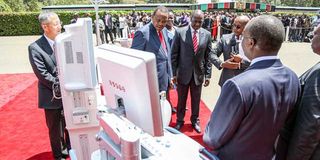Senate to exorcise ghosts of the MES lease scandal

Former President Uhuru Kenyatta and his then deputy William Ruto inspect medical equipment procured through the Managed Equipment Services project at State House, Nairobi.
The controversial Sh63 billion Medical Equipment Service (MES) lease is coming back to haunt officials involved in the project as Parliament is set to relaunch investigations into the deal.
The development comes after Senate Speaker Amason Kingi ordered the Committee on Health to reinvestigate the status of the multibillion-shilling programme.
It is barely three years since senators rejected a report by an ad hoc committee that spent more than a year investigating the deal. The renewed push was prompted by a call for evidence from nominated Senator Hamida Kibwana.
The nine-member committee, chaired by Uasin Gishu Senator Jackson Mandago, has been tasked with unravelling the details of the terms of the contract signed by the government on behalf of the counties, including the sums agreed and those paid since the project began.
The panel is also expected to disclose whether the project was put out to tender, who bid, who won and the cost of the bids, as well as the contracts signed by each county.
Ms Kibwana asked the committee to state the number of machines supplied and installed in each county, and to shed light on reports of a government decision to abandon the project, stating the impact of the decision on the provision of specialised health services.
The contract for the project was signed in 2015 for seven years, and, as such, expired in December last year, but it is not clear whether the counties signed up to renew the contracts.
“The committee should disclose the expected cost of leasing the equipment per county per month as the initial value was decided on the basis of a group of counties giving the criteria of the basis,” Ms Kibwana said. “They should also determine the viability of counties engaging with contractors individually and whether this engagement threatens the continuity of this project.”
The committee should also disclose the status of the Sh5.8 billion allocated to the project and how the funds will now be utilised in light of the reports of the project being abandoned. In addition, it should also disclose the details of a Sh3.6 billion payment disbursed between July and August 2022, revealing the company it was paid to and for what equipment per county.
When the project was first signed in 2015, the contract cost was Sh38 billion, but this was reviewed along the way and the amount increased to Sh63 billion under unclear circumstances.
Under the agreement, the Ministry of Health was to deduct a fixed amount of Sh90 million annually from each of the 47 counties, and at one point each devolved unit was required to pay Sh200 million annually.
No feasibility studies
At the time, governors criticised the Ministry of Health for forcing them to sign contracts for the supply of equipment, saying the ministry had failed to carry out feasibility studies in the counties before the roll-out.
Narok Senator Ledama Olekina described the project as one of the most controversial programmes in the history of healthcare in Kenya. He said the scope of the investigation should be widened to include whether the counties had the capacity to use the equipment and whether the project had been abandoned.
“This has been a very crazy scandal. It is an issue that has been controlled by a cabal or cartels, people who have invested billions of shillings. Maybe now that we have a change of guard, things can be handled differently because there was a lot of interest in the matter in the previous regime,” said the ODM legislator.
Elgeyo Marakwet Senator William Kisang’ went on to call for the formation of an ad hoc committee to conduct a forensic audit of the programme to ensure those found culpable are brought to book, tried and jailed.
He alleged that some senior officials planned the whole thing, and subsequently exposed taxpayers to paying for equipment they cannot see the benefit of.
“It is so sad that it is now seven years and every year we are budgeting and putting money down the drain on the pretext that we are leasing medical equipment. We don't even know who we are paying the billions,” said Mr Kisang’.
For his part, Kakamega Senator Boni Khalwale said the committee's findings should detail the action taken against senior Health ministry officials behind the scandal.
Opulence
“We have seen a display of opulence by senior officials who ran the ministry at the time. The committee should tell us whether the EACC is investigating this matter because the country deserves an answer,” he said.
An earlier report by a Senate ad hoc committee investigating the project said the entire procurement process—from conception to implementation—was shrouded in secrecy and reeked of irregularities and illegalities.
The report found that officials manipulated procurement laws, altered contracts and bulldozed county governments into accepting the equipment without proper consultation between the two levels of government.
However, the report was rejected by the Senate, with most senators voting against it on the grounds that the committee had not identified specific individuals who botched the programme.





